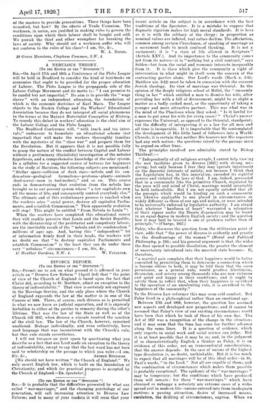DIVORCE REFORM.
[To THE EDITOR OF THE " SPECTATOR."] SIR,—Permit me to ask on what ground it is affirmed in your article on "Divorce Law Reform " (April 3rd) that " the point of view of the Church of England is based upon the fact that Christ did, according to St. Matthew, admit an exception to the theory of indissolubility." That view is certainly not expressed in the Marriage Service, and the only place where the Church of England expounds the law of the matter is in one of the Canons of 1604. There, of course, such divorce as is permitted is what we now know as judicial separation, and it is expressly forbidden to either of the parties to remarry during the other's lifetime. That was the law of the State as well as of the Church till 1857, when divorce a vinculo received the sanction of the civil-law. The law of the Church, however, remained unaltered. Bishops individually, and even collectively, have used language that was inconsistent with the Church's rule, but that rule stands nevertheless.
I will not trespass on your space by questioning what you describe as a fact that our Lord made an exception to the theory of indissolubility, except to say that the last word has not been said by scholarship on the passage to which you refer.—.I ern,
[We should not have written " the Church of England." We only meant English law, which is built on the. foundation of Christianity, and which for practical purposes is accepted by the Church of England.—ED. Spectator.]


































 Previous page
Previous page